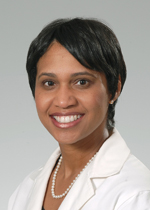Health
What is Fatty Liver Disease?
Dr. Gia Tyson, MD, Ochsner Multi-Organ Transplant Institute New Orleans and Baton Rouge, practices general hepatology, transplant hepatology as well as gastroenterology.
Receiving a diagnosis of fatty liver disease can be confusing. What is it? What can you do to reverse the disease?
Fatty liver disease can be an early warning sign of future risk of type 2 diabetes and cardiovascular disease. Fatty liver disease is a consequence of the body’s inability to process sugar in our cells, and is associated with diabetes, heart disease and/or high blood pressure.
More than one-third of adult Americans suffer from fatty liver disease that is unrelated to alcohol consumption. Excessive alcohol consumption can cause fatty deposits in the liver, causing what is known alcoholic liver disease and alcoholic hepatitis. However, non-alcoholic fatty liver disease (NAFLD) is an accumulation of fat in the liver of people who drink little or no alcohol. Unfortunately, fatty liver produces no symptoms on its own, so people often only learn about this when they see their physician for a routine exam. It is commonly diagnosed based on abnormal liver tests in the presence of fat seen on ultrasound.
While NAFLD affects all age groups, the risk of developing cirrhosis and liver failure is greatest in people over 45 years old who are affected by obesity, diabetes or both. Those who have elevated cholesterol and triglyceride levels are also at higher risk. Early sign and symptoms include fatigue, drowsiness, dull abdominal discomfort in the upper abdomen and skin discoloration.
What to do if you are found to have fatty liver disease
· Getting treatment for any underlying disease, such as diabetes, is essential.
· Immediately limit intake of alcohol, drugs and any unnecessary medication.
· If you are overweight or obese, gradually lose weight. Studies show that weight loss of at least 10% over a period of months can help reverse non-alcoholic fatty liver disease.
· Lifestyle changes, increased in physical activity and avoiding meals high in carbohydrates are the most effective methods to reduce fatty liver disease.
· Exercise is of serious importance in reversing fatty liver disease as it strengthens the muscles and redistributes body fat.
· Vitamin E alone or in combination with an oral hypoglycemic (a diabetic pill) can reverse the liver inflammation caused by fatty deposition.
To make an appointment with Dr. Gia Tyson, call 225.761.5200.



0 comments